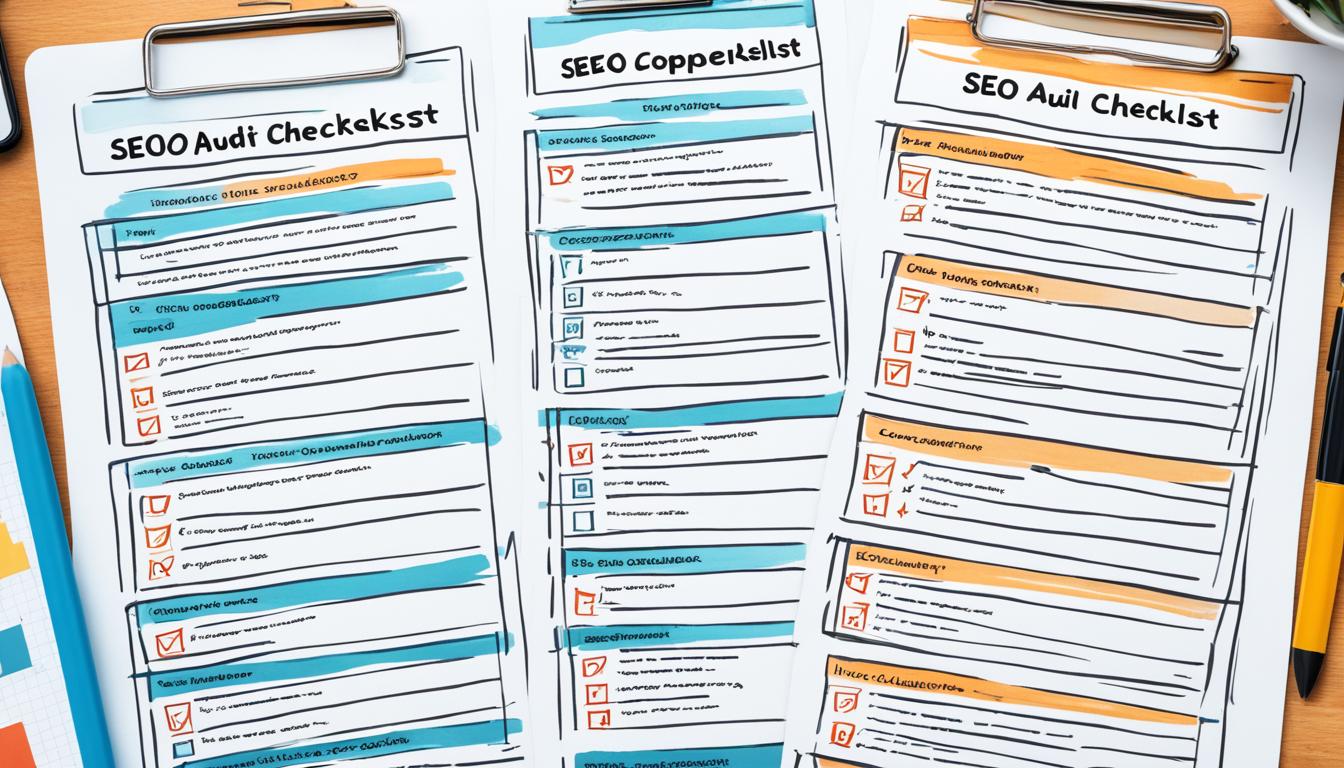
Welcome to the complete SEO audit checklist, your comprehensive guide to improving your website's performance and visibility in the US market. Conducting an SEO audit is crucial for identifying areas where your site may be lacking in terms of search engine optimization, and this checklist will ensure you cover all the essential elements needed for success.
Key Takeaways:
- An SEO audit is essential for improving your site's performance and visibility in the US market.
- The checklist covers all the key elements, including on-page optimization, keyword research, technical SEO, and backlink analysis.
- Implementing the checklist involves optimizing your content, improving site speed and mobile optimization, and enhancing user experience.
- By following the recommendations in the checklist, you can greatly improve your site's performance and search engine rankings.
- Regularly conduct SEO audits to stay on top of changes and ensure ongoing optimization for your website.
Key Elements of an SEO Audit Checklist
When conducting an SEO audit, several key elements need to be considered to ensure your website's optimization. These elements include on-page optimization, keyword research, technical SEO, and backlink analysis.
On-Page Optimization
On-page optimization involves optimizing the content, meta tags, and URLs of your website. By strategically incorporating relevant keywords into your content and meta tags, you can increase the visibility and relevance of your website on search engine result pages. Additionally, ensuring that your URLs are concise and descriptive can improve user experience and make it easier for search engines to crawl and index your site.
Keyword Research
Keyword research is vital in understanding the search terms and phrases that your target audience uses when looking for products, services, or information related to your industry. By identifying the most relevant and high-performing keywords, you can optimize your content to rank higher in search engine results. Keyword research tools, such as Google Keyword Planner or SEMrush, can help you discover these keywords and assess their search volume and competition.
Technical SEO
Technical SEO focuses on identifying and fixing any technical issues that may impact your website's performance and visibility in search engine results. This includes ensuring proper website indexing, optimizing website speed and performance, implementing structured data markup, improving mobile optimization, and resolving any crawl errors or broken links. Technical SEO optimizations ensure that search engine crawlers can easily understand and access your website, resulting in improved rankings and user experience.
Backlink Analysis
Backlink analysis is the process of evaluating the quality and quantity of backlinks pointing to your website. Backlinks from authoritative and relevant sources play a crucial role in determining your website's credibility and search engine rankings. By analyzing your backlink profile, you can identify any low-quality or toxic backlinks that may be harming your site's SEO. Additionally, backlink analysis can help you uncover opportunities to build high-quality backlinks through outreach, content marketing, or collaboration with industry influencers.
Overall, a comprehensive SEO audit checklist that incorporates these key elements can help you identify areas for improvement and optimize your website for better search engine visibility and user experience.

Implementing the SEO Audit Checklist
Implementing the SEO audit checklist is a vital step in optimizing your website's performance and increasing its visibility in the search results. By focusing on content optimization, site speed, mobile optimization, and enhancing the user experience, you can ensure that your website meets the needs of both search engines and your target audience.
Content optimization plays a crucial role in attracting organic traffic to your site. By creating high-quality, relevant content and strategically incorporating targeted keywords, you can improve your site's relevance and authority in the eyes of search engines, ultimately helping you rank higher in search results.
Site speed optimization is another key factor in today's fast-paced digital landscape. With users demanding instant access to information, a slow-loading website can severely impact user experience and discourage visitors from exploring further. By reducing page load times, you can provide a seamless and enjoyable browsing experience, which not only pleases your users but also improves your search engine rankings.
Mobile optimization is essential in today's mobile-first world. With the majority of internet users accessing the web through mobile devices, it is crucial to ensure that your website is fully responsive and optimized for mobile viewing. By creating a mobile-friendly experience, you can reach a larger audience and improve your chances of ranking higher in mobile search results.
Enhancing the user experience is the foundation of a successful website. By improving navigation, organizing site structure, and enhancing overall functionality, you can create an intuitive and user-friendly environment that keeps visitors engaged and encourages them to explore further. A positive user experience not only increases visitor satisfaction but also improves your site's credibility and likelihood of conversions.
In conclusion, by implementing the recommendations provided in the SEO audit checklist, you can optimize your website's content, improve site speed, optimize for mobile devices, and enhance the overall user experience. By prioritizing these elements, you will not only boost your site's performance in search engine rankings but also provide a satisfying and engaging experience for your target audience.
FAQ
What is an SEO audit checklist?
The SEO audit checklist is a comprehensive guide to improving the performance of your website. It helps identify areas where your site may be lacking in terms of search engine optimization.
What are the key elements of an SEO audit checklist?
The key elements of an SEO audit checklist include on-page optimization, keyword research, technical SEO, and backlink analysis.
What is on-page optimization?
On-page optimization involves optimizing your website's content, meta tags, and URLs to improve search engine rankings.
How does keyword research help in SEO?
Keyword research helps determine the most relevant keywords to target for improved search engine rankings.
What is technical SEO?
Technical SEO involves checking for any technical issues that may affect your site's performance, such as page load times and website structure.
Why is backlink analysis important?
Backlink analysis examines the quality and quantity of backlinks pointing to your site, which is crucial for higher search engine rankings.
How do I implement the SEO audit checklist?
Implementing the SEO audit checklist involves optimizing your website's content, improving site speed, optimizing for mobile devices, and enhancing the user experience.
What is content optimization?
Content optimization includes creating high-quality, relevant content and optimizing it with targeted keywords to improve search engine rankings.
How can I optimize site speed?
Site speed optimization involves reducing page load times for better user experience and search engine rankings.
What is mobile optimization?
Mobile optimization ensures your website is fully responsive and optimized for mobile devices.
How can I enhance the user experience?
Enhancing the user experience involves improving navigation, site structure, and overall functionality to provide a seamless browsing experience.
How can the SEO audit checklist improve my site's performance?
By following the recommendations in the SEO audit checklist, you can greatly improve your site's performance and visibility in the search results.











